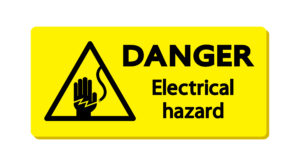Fires can happen in an instant, and lead to life-long consequences. No more is this illustrated than in a recent case investigated by the Health and Safety Executive (HSE) in which a man was severely burnt while refuelling a tank of petrol while at work. The accident occurred in January 2015 at a retail outlet where workers were insulating the ceiling cavity of a building. The process involved a vehicle which was outside of the building which fed insulating foam inside via a hose. During the process of injecting the insulation, the spray gun stopped working and one of the men entered the vehicle to investigate what had happened. Realising the generator had run out of fuel, the man removed a jerry-can filled with petrol from its secured housing and opened it; as a result, petrol sprayed over him and inside the vehicle. The petrol immediately ignited, setting the worker alight. The man’s injuries were so severe he was placed into a coma for three months and then required a stay in hospital for more than 12-months.
On investigation by the HSE, it was discovered that the employer, Greenseal Insulation Ltd, had not fulfilled its duties with regard to dangerous substances, in this case, petrol. The failings included:
- using diesel rather than petrol (diesel is less flammable than petrol)
- not storing the petrol away from ignition sources
- requiring frequent refills – once every 2 hours – this should have been reduced to once per day when the equipment was cool
- not using a non-spilling fuel delivery nozzle
Tragically, it was the workers second day on the job.
Last month, Greenseal Insulation Ltd was fined £40,000 and ordered to pay costs of nearly £12,000 after they pleaded guilty to breaching the Dangerous substance substances and explosive atmospheres regulations (DSEAR) 2002.
What is DSEAR (2002)?
DSEAR is specifically designed to protect workers from fire or explosion due to dangerous substances. According to HSE, dangerous substances may include solvent paints varnishes, LPG, dust from machines or foodstuffs, pressurised gases, and substances corrosive to metal. In practical terms, these regulations require that employers:
- locate all potentially dangerous substances within the workplace
 and determine the associated risks
and determine the associated risks - control the risks of any dangerous substances (ideally removing them completely)
- mitigate the impact of the substance as much as possible
- plan for any emergency resulting from a dangerous substance
- train and inform staff fully regarding the dangers of such substances
- avoid ignition sources where there may be an explosive atmosphere
Recovering from burns in the workplace
Depending on the severity of the burns, a large amount of medical treatment and therapy may be required, and this process can take months or even years. Especially in the initial period, burns can be extremely painful necessitating lots of pain relief, and can lead to infections, blood clots, mobility issues, scarring, and in terms of mental health, depression, anxiety, and even post-traumatic stress disorder (PTSD). Depending on the depth and extent of burns, surgery may be required to graft new skin over more severely damaged areas of the body, or to remove burnt skin to encourage new, healthier growth (debridement).
Full thickness burns, whereby as all three layers of the skin are damaged, including the epidermis, dermis and subcutis, can take a great deal of time to heal. Once the initial period of recovery is over, it is likely that if you have suffered severe burns, physiotherapy will be required to regain full mobility, especially where skin is contracted due to scarring.
Unfortunately, for some, their burns are so severe, they are unable to return to work, and may require ongoing care; in such cases compensation is essential.
Can I claim compensation if I have been burnt at work?
As it is your employer’s duty to ensure you are safe while working, if you have suffered a serious burn due to a fire because of their negligence, you may be able to claim for general and special damages. General damages compensation covers the pain you have suffered, both mentally and physically as a result of your accident; special damages covers any money have lost or have had to pay out due to your injuries, and can include: medical expenses and care, out of pocket expenses such as travel and accommodation, medication, loss of earnings to date and those expected in the future, and modifications and equipment to assist you at home. As long as you make your claim within three years (there are some exceptions to this rule) and can provide sufficient evidence to back up your claim, you can be assured we will give you the best chance of securing the compensation you deserve to put your life back on track – this is the very least your employer owe you.
At Russell Worth Solicitors we specialise in personal injury claims. If you have suffered a workplace injury and would like a free claim assessment, please call us now on 0800 028 2060 or complete our Online Claim Assessment.

